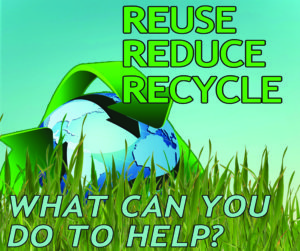By SAMI MCGUIRE
Student Writer
 Each person in the United States produces about four pounds of garbage a day.
Each person in the United States produces about four pounds of garbage a day.
According to the U.S. Census Bureau, there are 318.9 million people in the U.S. That means the U.S., as a total, creates about 1.3 billion pounds of garbage a day.
Some Alva residents say northwest Oklahoma doesn’t have to be concerned with the notion of “going green.” They also say this area isn’t polluted because there are no big cities and towns are spread thinly.
This assumption is a false one.
On November 4, 2015 Northwestern’s campuses met with Conserving Our Ranger Environment (CORE) to bring attention to these faulty assumptions and talk about recycling.
Although Alva, in the past, has made attempts at recycling and failed, people, like the members of CORE, are still trying to work through this problem to make Alva a more environmentally friendly place.
The event has caused no immediate action, but Janet Cunningham, president at Northwestern, said the event brought a lot of attention to the importance of recycling.
CORE is not only about recycling though. Their mission is to raise awareness of environmental issues within the university and northwestern Oklahoma communities.
This includes recycling trips to Kiowa, Kansas, collecting unwanted items at the end of semesters to donate and putting on events to raise awareness. One of the events included showing the controversial movie, Cowspiracy, which challenges animal agriculture as the leading cause of environmental destruction.
While this area may not have many big cities, it does have plenty of agriculture. Steven Mackie, associate professor of education and CORE member, said our area possibly could be more polluted than urban areas because of agriculture.
According to Conserve Energy Future’s article “Agricultural Pollution,” agriculture, for thousands of years, was natural process, the land could be reused many times and the ground would stay fertile. Modern day agriculture causes degradation of the ecosystem, land and environment.
The top causes of agricultural pollution are pesticides, fertilizers, contaminated water, soil erosion, sedimentation and over population of livestock.
Although agriculture isn’t something the average student can change, there are many other things people can do to help the environment.
Christopher Satterfield, graduate student at Northwestern, had some ideas on things people can change in their daily routine to be more environmentally friendly. “Start out small by conserving small things such as food and water,” Satterfield said. “Then move on to bigger things such as recycling. It is hard to just jump into a lifestyle change. My advice would be to start out small and work your way up.”
Satterfield is an active member of CORE, and has been for the past year. He said he joined because he wanted to make an impact on campus by “promoting sustainability of resources and other environmental issues.”
Northwestern campuses have changed things to be more environmentally friendly as well. The campuses recycle cardboard and printer cartridges, Cunningham said. Donations were made to put in the attachments on the water fountains so that you can refill water bottles on the Enid campus and in Alva’s library. Cunningham also said they have a committee looking at printing on campus because the school uses a tremendous amount of paper.
To try to conserve paper, Cunningham said they encourage teachers to post things online instead of printing everything out. “It hasn’t generated as much saving as they hoped but it’s the right thing to do.” In 2003, the school also changed light bulbs and looked at all the heating and air systems to be more energy efficient.
All these actions that the school has taken fit in to the many interpretations of the term “going green.” Cunningham said she thinks the term means to “conserve the environment as much as possible.”
Mackie said “going green” is a broad term, and it can relate to everything from “recycling to using clean energy to eliminating waste.”
“Going green is more than just recycling your materials or watching how much water you use,” Satterfield said. “Going green is a lifestyle that includes these things. It is about keeping Earth healthy and beautiful. We only get one planet to live on, why would we want to destroy that?”

